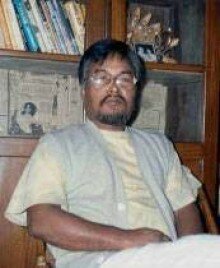
Born in 1957, Chandrakanta Murasingh is one of the best-known poets from the Northeast Indian state of Tripura. He writes in Kokborok, the language of the indigenous tribe of the state, and has published five books of poetry. His poetry reveals a commitment to recording “the agonies of life in contemporary Tripura”, a land where “the ugly thud of the boots of both extremists and the Indian Army” is fast replacing the cadence of rivulet and birdsong. He received the Bhasha Samman Award from the Sahitya Akademi, New Delhi, in 1976 for his contribution to the development of Kokborok literature. He lives in Abhoynagar, Agartala, and works in a bank.
Born to a family of shifting cultivators in the remote hamlet of Twibandal, Murasingh recalls his early struggle to receive a primary education. He describes his poetic enterprise as an attempt to capture the varied tones and shades of the Tripura landscape. This, as his poetry reveals, is not a merely natural landscape, but the complex terrain of everyday negotiation where nature and politics, the physical and the cultural, are inextricably engaged. And so, as he tells Kynpham Sing Nongkynrih in an interview also published on this site, his poetry actually embraces a vast topography, from the emerald green fields of distant tribal hamlets to the sophisticated environs of Kolkata seminar rooms.
He remains acutely aware that he represents a language that has faced a long history of marginalisation (Kokborok was declared a state language as recently as 1979). While he acknowledges certain similarities between the poets of the Northeast, he is conscious of the trend to view the region as culturally amorphous – an impulse that invariably irons out the distinctive identity problems faced by smaller ethnic groups like his own.
The poems included in this edition reveal the sharp edge of political critique. The poet’s chief tool is irony, which he deploys with a skill that can be both savage and understated. His poetry is scathing in its indictment of a world where “words are so cheap and so much in supply,/ That no government pays any heed to them”. But the word still remains the chief resource in the poet’s arsenal and Murasingh is acutely aware of this: in another poem, he asserts his right over ‘the one word’, marking an active stance of resistance against forces that crush, erase and rewrite histories.
A lyrical and elegiac vein accompanies the pungency of satire. Far from being romantic or escapist, his vivid evocation of his beloved and embattled forests make his political comment all the more searing. The reader also begins to realise that there are certain moments in the process of cultural, political and spiritual upheaval that can be archived only by the voice of a poet:
The haunting madhavi fragrance escapes the rustle of spring air.
It is acrid with the smell of gunpowder.
Also on this Site:
The Thud of Boots and the Odour of Gunpowder
Interview with Chandrakanta Murasingh by Kynpham Sing Nongkynrih.
The Poet as Chronicler
An Overview of Contemporary Poetry in Northeast India, by Kynpham Sing Nongkynrih.
Bibliography
Haping Garingo Chibuksa Ringo. Shyamlal Debbarma, Kokborok Sahitya Sahitya Sanskriti Samsad, Agartala 1987.
Holong Kok Sao Bolong Bisingo. Shyamlal Debbarma, Kokborok Sahitya Sanskriti Samsad, Agartala 1995.
Lok Chethuwang Lok. Akshar Publications, Krishnanagar 1999.
Pindi Watawi Pin. Hachukni Khorang Publisher, Agartala 1999.
Ruphaini Buduk Ani Nogo. Tripura Publisher, Agartala 2002.
Links
In English
The Telegraph, Calcutta – Northeast
A news item that mentions Murasingh and others having been appointed members of the Tripura Tribal Language Commission.

